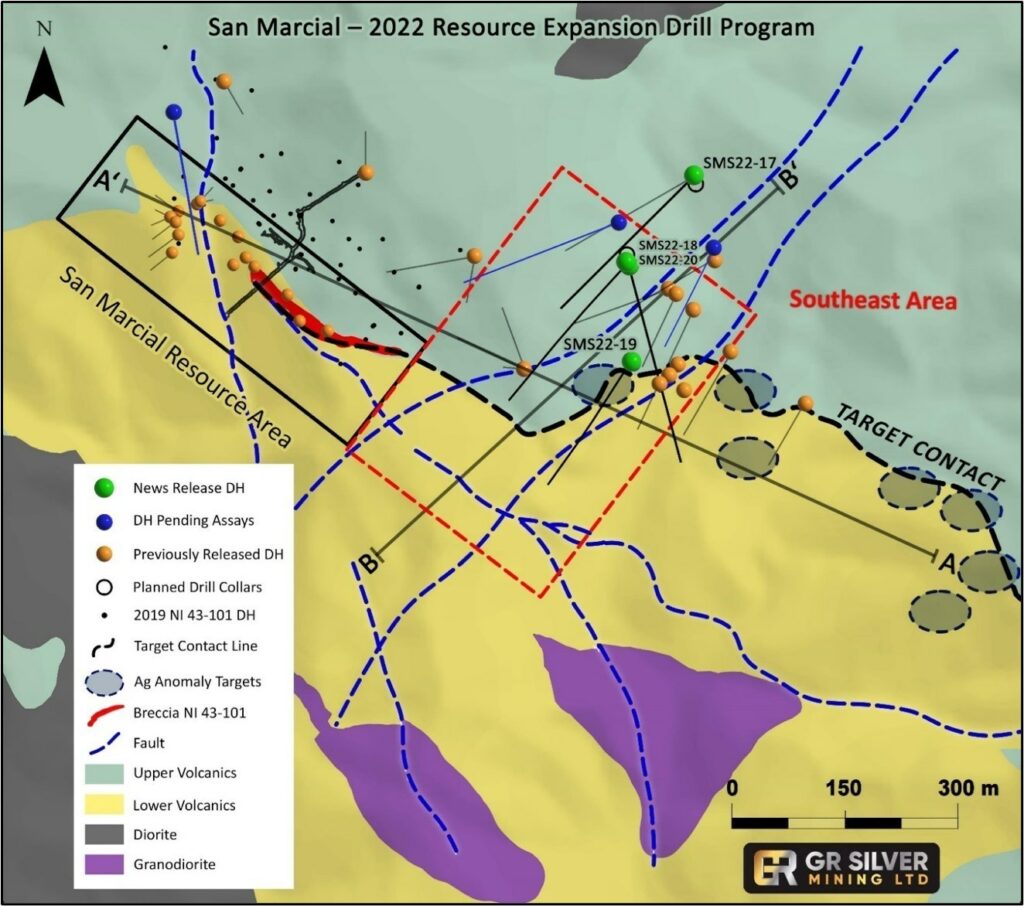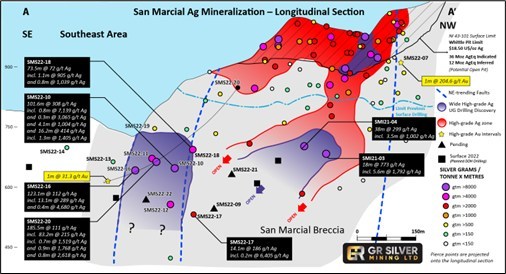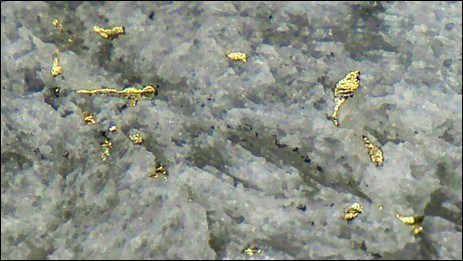Vancouver, BC – GR Silver Mining Ltd. (“GR Silver Mining” or the “Company”) (TSXV|GRSL, OTCQB|GRSLF, FRANKFURT|GPE) – is pleased to announce additional surface drilling success in the new high-grade Southeast Area (“SE Area”) silver (Ag) discovery, at the Company’s wholly-owned Plomosas Project, in Sinaloa, Mexico. The four new holes represent extensions along strike or down dip, or drilling at different orientation, to delineate mineralization geometry and boundaries. Each of the holes has provided positive silver results and geological information to enhance the existing knowledge in the SE Area. The Company expects to complete three more drill holes in the SE Area prior to the December cut-off date for data to be incorporated into the 3D geological model, with the updated resource estimation expected to be released in Q1|2023.
Highlights from the latest drilling results at the San Marcial SE Area:
- SMS22-17: 14.1 m at 186 g/t Ag
including 0.2 m at 6,405 g/t Ag, 0.12 g/t Au, 10.1% Pb and 17.9% Zn
- SMS22-18: 73.5 m at 72 g/t Ag
including 1.1 m at 905 g/t Ag
and 0.8 m at 1,039 g/t Ag
SMS22-18 intersected mineralization similar to, and up dip from, the previously announced SMS22-10 discovery in the SE Area, where multiple high-grade intervals are hosted in a wide zone with a predominance of Ag-rich hydrothermal breccias and stockworks
- SMS22-20: 185.5 m at 111 g/t Ag
including 83.2 m at 215 g/t Ag
including 0.7 m at 1,519 g/t Ag
and 0.9 m at 1,768 g/t Ag
and 0.8 m at 2,618 g/t Ag
SMS22-20 was drilled perpendicular to the NE-trending mineralized corridor hosting the SE Area discovery, to confirm its geometry, as well as the position of the bounding NE-trending structures. This hole successfully intersected the structural and mineralization objectives, while also intersecting a high-grade gold (Au) zone on the margins of the corridor.
- The first ever visible gold occurrence at San Marcial was identified in SMS22-20, returning 1m at 31.3 g/t Au, within a quartz vein on the margins of the NE-trending SE Area Ag-mineralized corridor. The visible Au (Figure 3) is located below the main wide high-grade Ag mineralized zone, supporting the opportunity for new Au discoveries in the SE Area.
- The drilling program at the SE Area, continues to define the geometry and lateral extents of the mineralization. The latest drill holes have successfully tested the mineralization stepping out from the discovery hole (SMS22-10), along the northern margin of the NE-trending mineralized corridor. SMS22-20 was the first hole drilled perpendicular to the NE-trending corridor successfully defining its boundaries and allowing a better understanding of the footprint of mineralization that will potentially be incorporated into the resource estimation update planned in Q1|23.
GR Silver Mining Chairman and CEO, Eric Zaunscherb comments “It is very satisfying to see the emergence of the SE Area as a potential contributor to the upcoming resource estimation update. Our geological team has done a superb job in identifying this target and efficiently probing its geometry and continuity in recent drilling. As the exploration model has evolved, the potential for incremental mineralization further along the Target Contact to the southeast is intriguing. The new recognition of high-grade Au mineralization in the relatively untested margins of NE-trending structures at San Marcial may be a significant development for the Plomosas Project.”

Drilling Program Southeast Area
GR Silver Mining plans to complete three additional holes by December, and have all assays received by early 2023. The 2022 program was the first drilling to be undertaken in the SE Area, after successful completion of modern exploration, and resulting in a discovery. The Target Contact (Figure 1) will be the main focus of the Company’s surface program in the coming months, particularly in areas coincident with Ag anomalies from surface geochemical sampling.
A description of each drill hole and results are as follows:
SMS22-17 was designed to test the northern margin of the NE-trending SE Area mineralized corridor, at depth 115 m below the discovery hole, SMS22-10. It is also lateral to hole SMS22-12 which intersected 44.5 m at 98 g/t Ag (see News Release dated September 7, 2022). SMS22-17 intersected 14.1 m at 186 g/t Ag including a high-grade intercept of 0.2 m at 6,405 g/t Ag that also contained 10.1% Pb and 17.9% Zn (Table 1). This geochemical combination suggests that this hole position is transitional between the SE Area Ag- rich mineralization and the more typical Ag-Pb-Zn San Marcial Breccia style of mineralization in the San Marcial Resource Area (Figure 2).
SMS22-18 also tested the northern margin of the NE-trending SE Area mineralized corridor 90 m above the SMS22-10 discovery hole. The hematite cemented hydrothermal breccia encountered in SMS22-18 is consistent with the high-grade breccias in the discovery hole, and returned 73.5 m at 72 g/t Ag, including high-grade intervals such as 0.8 m at 1,039 g/t Ag (Table 1). This hole successfully extends the SE Area mineralized zone to higher levels than previously seen (Figure 2).
SMS22-19 was drilled 75 m up dip from hole SMS22-11 to define the extent of the SE Area mineralization in upper levels but also to extend into the footwall volcano-sedimentary unit (Figure 1) where a secondary breccia sub parallel to the San Marcial Resource Area breccia was interpreted to extend. At shallow levels, the hole intersected the hematitic cemented breccia characteristic of the SE Area with 28.9 m at 30 g/t Ag. The secondary breccia was not present. The drill hole was positive, intersecting wide Ag mineralization in an area previously identified during surface litho-geochemical sampling.
SMS22-20 is an important strategic hole that was oriented perpendicular to the NE-trending mineralized corridor that hosts the SE Area discovery mineralization (Figure 1). It was designed to confirm the geometry of the mineralization and validate the importance of the two NE-trending faults that appear to control the location of the high-grade Ag mineralization. Both NE-trending faults were successfully cut by this drill hole, while also intersecting the wide high-grade mineralized zones identified in the discovery hole SMS22-10 as well as SMS22-11 and SMS22-16. The hole resulted in an interval of 185.5 m at 111 g/t Ag, including numerous intercepts >1,000 g/t Ag (Table 1) – one of the best holes drilled to date at San Marcial. This hole provides the Company with much greater confidence in the new SE Area mineralized zone and will assist with 3D modelling of the high-grade Ag body as we prepare for an update of the San Marcial mineral resource estimate.
In addition to the significant Ag mineralization in hole SMS22-20, the hole also produced the first ever examples of visible gold (Figure 3). At depth outside (to the south) of the NE-trending Ag mineralized corridor, a crystalline quartz vein, within a silicified volcano-sedimentary unit thought to be barren, was identified with fine grained disseminated visible Au within a sample that returned 1m at 31.3 g/t Au (Figure 2).
The San Marcial and SE Area breccias are generally devoid of Au with only sporadic low-grade values encountered to date, however a series of significant (>5 g/t) Au results have been drilled at San Marcial below the wide high-grade Ag mineralized zone. The volcano-sedimentary unit in the footwall below the San Marcial Breccia was in the 2019 Resource Area identified as a focus for low-grade Au mineralization. In addition to this a series of high-grade Au result on the margins of the NE-trending structural corridor have indicated potential for gold discoveries in the vicinities of the resource area. The most significant Au results to date were from drill hole SM-19-01, which intersected 1 m at 204.6 g/t Au and SMS22-20, which intersected 1 m at 31.3 g/t Au (Figure 3).
These two holes with high-grade Au were drilled in margins of NE-trending structures in the silicified volcano- sedimentary unit below the San Marcial Breccia. Most of the previous drill holes in San Marcial were drilled perpendicular to the NW trend, and there is a possibility that the NE trend has been disregarded but could be associated with deep feeders where Au could be transported and concentrated in separate low sulphidation style epithermal veining. This provides a potential new target for exploration for additional high-grade Au at San Marcial. GR Silver Mining continues to identify additional targets in the SE Area utilizing extensive geophysical, geochemical, and geological data collected systematically over the past two years.


Table 1: San Marcial SE Area – Latest Results Highlights
| Drill Hole | From (m) | To (m) | Apparent width (m) | Ag g/t | Au g/t | Pb % | Zn % |
| SMS22-17 | 238.6 | 245.0 | 6.4 | 2 | 0.25 | na | na |
| 287.1 | 301.2 | 14.1 | 186 | 0.02 | 0.4 | 1.1 | |
| including | 287.1 | 290.9 | 3.8 | 595 | 0.03 | 0.8 | 1.4 |
| including | 288.0 | 288.2 | 0.2 | 6,405 | 0.12 | 10.1 | 17.9 |
| SMS22-18 | 137.7 | 211.2 | 73.5 | 72 | 0.01 | na | na |
| including | 138.4 | 139.5 | 1.1 | 905 | 0.02 | 0.1 | 0.2 |
| and | 163.5 | 167.3 | 3.8 | 324 | 0.02 | na | na |
| and | 175.4 | 176.2 | 0.8 | 1,039 | 0.01 | 0.2 | 0.5 |
| and | 207.0 | 209.0 | 2.0 | 344 | 0.01 | 0.1 | 0.1 |
| SMS22-19 | 16.3 | 45.2 | 28.9 | 30 | na | na | na |
| SMS22-20 | 150.7 | 336.2 | 185.5 | 111 | 0.08 | na | 0.1 |
| including | 157.0 | 240.2 | 83.2 | 215 | 0.04 | 0.1 | 0.1 |
| including | 177.7 | 178.4 | 0.7 | 1,519 | 0.02 | na | na |
| and | 196.0 | 197.0 | 1.0 | 1,068 | 0.08 | na | na |
| and | 204.7 | 205.6 | 0.9 | 1,768 | 0.04 | 0.2 | 0.3 |
| and | 228.4 | 229.2 | 0.8 | 2,618 | 1.01 | 0.3 | 0.9 |
| 331.5 | 336.2 | 4.7 | 13 | 1.62 | na | 0.2 | |
| 360.0 | 361.0 | 1.0 | 3 | 4.97 | na | na | |
| 378.0 | 379.0 | 1.0 | 15 | 31.30 | na | na |
Numbers may be rounded. Results are uncut and undiluted. True width not estimated as the Company does not have sufficient data from the new mineralized zones to determine the true widths of the drill hole intervals with any confidence. “na” = no significant result.
Table 2: 2022 San Marcial Drill Program – SE Area Latest Drill Hole Details
| Drill Hole | East (m) | North (m) | RL (m) | Dip (˚) | Azimuth (˚) | Depth (m) | Results Status |
| SMS22-17 | 451473 | 2546016 | 723 | -50 | 225 | 380.0 | This release |
| SMS22-18 | 451388 | 2545903 | 760 | -48 | 225 | 336.0 | This release |
| SMS22-19 | 451389 | 2545770 | 709 | -50 | 210 | 306.5 | This release |
| SMS22-20 | 451388 | 2545903 | 760 | -50 | 160 | 396.0 | This release |
| SMS22-21 | 451376 | 2545957 | 766 | -55 | 245 | 342.5 | Pending |
| SMS22-22 | 451501 | 2545921 | 700 | -55 | 202 | In Progress |
WGS84 Datum
QA/QC Procedures
The Company has implemented QA/QC procedures which include insertion of blank, duplicate and standard samples in all sample lots sent to SGS de México, S.A. de C.V. laboratory facilities in Durango, Mexico, for sample preparation and assaying. For every sample with results above Ag >100 ppm (over limits), these samples are submitted directly by SGS de Mexico to SGS Canada Inc. at Burnaby, BC. The analytical methods are four acid Digest and Inductively Coupled Plasma Optical Emission Spectrometry with Lead Fusion Fire Assay with gravimetric finish for silver above over limits. For gold assays the analytical methods are Lead Fusion and Atomic Absorption Spectrometry Lead Fusion Fire Assay and gravimetric finish for gold above over limits (>10 ppm).
Qualified Person
The Qualified Person under National Instrument 43-101 Standards of Disclosure for Mineral Projects for this news release is Marcio Fonseca, P. Geo., President & COO for GR Silver Mining, who has reviewed and approved its contents.
About GR Silver Mining Ltd.
GR Silver Mining is a Canadian-based, Mexico-focused junior mineral exploration company engaged in cost- effective silver-gold resource expansion on its 100%-owned assets, located on the eastern edge of the Rosario Mining District, in the southeast of Sinaloa State, Mexico. GR Silver Mining controls 100% of two past producer precious metal underground and open pit mines, within the expanded Plomosas Project, which includes the integrated San Marcial Area and La Trinidad acquisition. In conjunction with a portfolio of early to advanced stage exploration targets, the Company holds 734 km2 of concessions containing several structural corridors totaling over 75 km in strike length.
GR Silver Mining Ltd.
Eric Zaunscherb
Chairman & CEO
For further information, please contact:
Brenda Dayton
VP Corporate Communications
Telephone: +1.604.417.7952
Email: bdayton@grsilvermining.com
Cautionary Statement Regarding Forward-Looking Information
This press release contains “forward-looking statements” within the meaning of applicable Canadian securities legislation and information that are based on the beliefs of management and reflect the Company’s current expectations. When used in this press release, the words “estimate”, “project”, “belief”, “anticipate”, “intend”, “expect”, “plan”, “predict”, “may” or “should” and the negative of these words or such variations thereon or comparable terminology are intended to identify forward-looking statements and information. Such statements and information reflect the current view of the Company. Risks and uncertainties may cause actual results to differ materially from those contemplated in those forward-looking statements and information. By their nature, forward-looking statements involve known and unknown risks, uncertainties and other factors which may cause our actual results, performance or achievements, or other future events, to be materially different from any future results, performance or achievements expressed or implied by such forward-looking statements.
Neither the TSX Venture Exchange nor its Regulation Services Provider (as that term is defined in the policies of the TSX Venture Exchange) accepts responsibility for the adequacy or accuracy of this press release.
Original Article: https://grsilvermining.com/wp-content/uploads/2022/11/GRSL.NewsRelease.21NOV22.final_.pdf

















